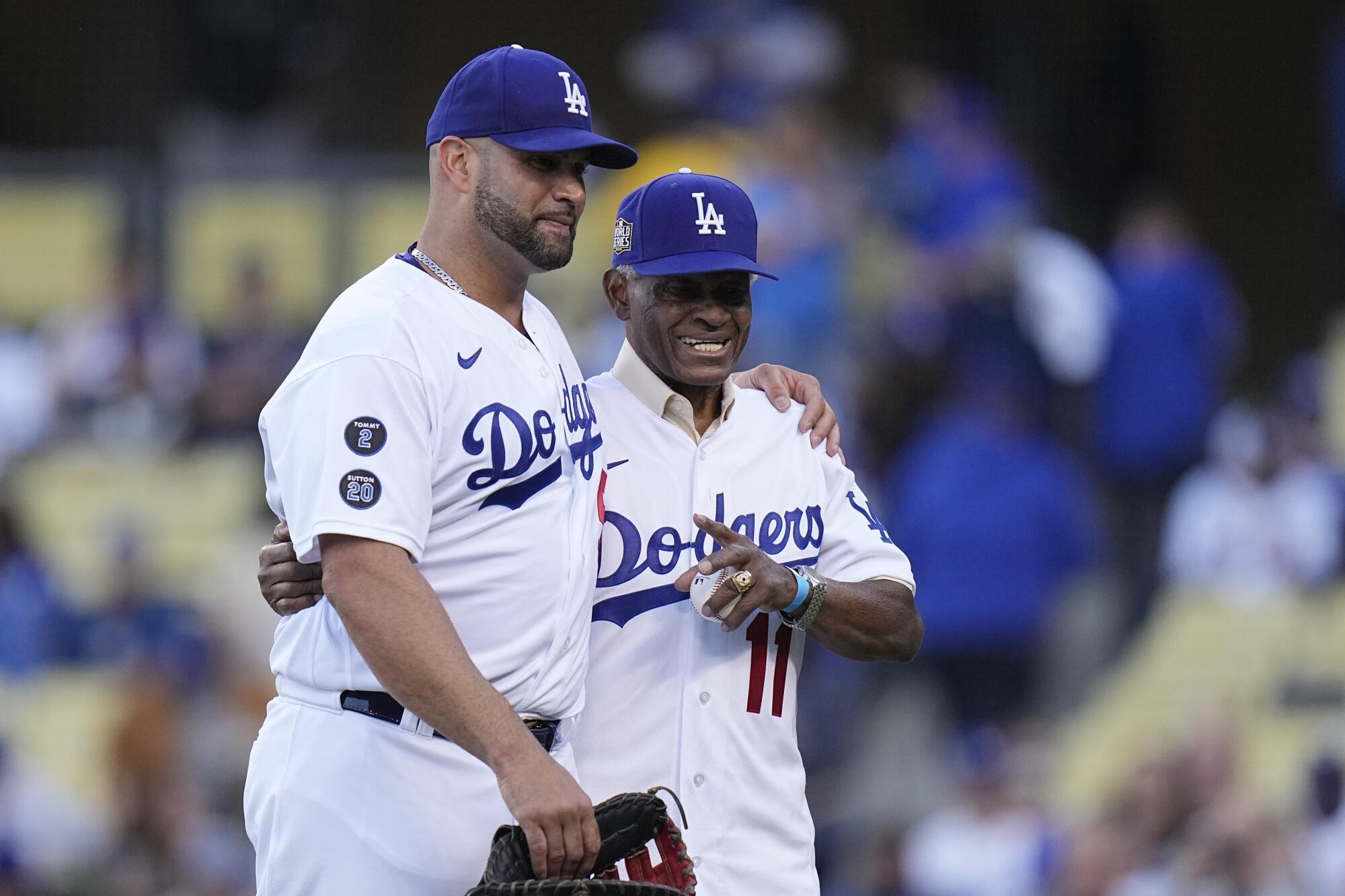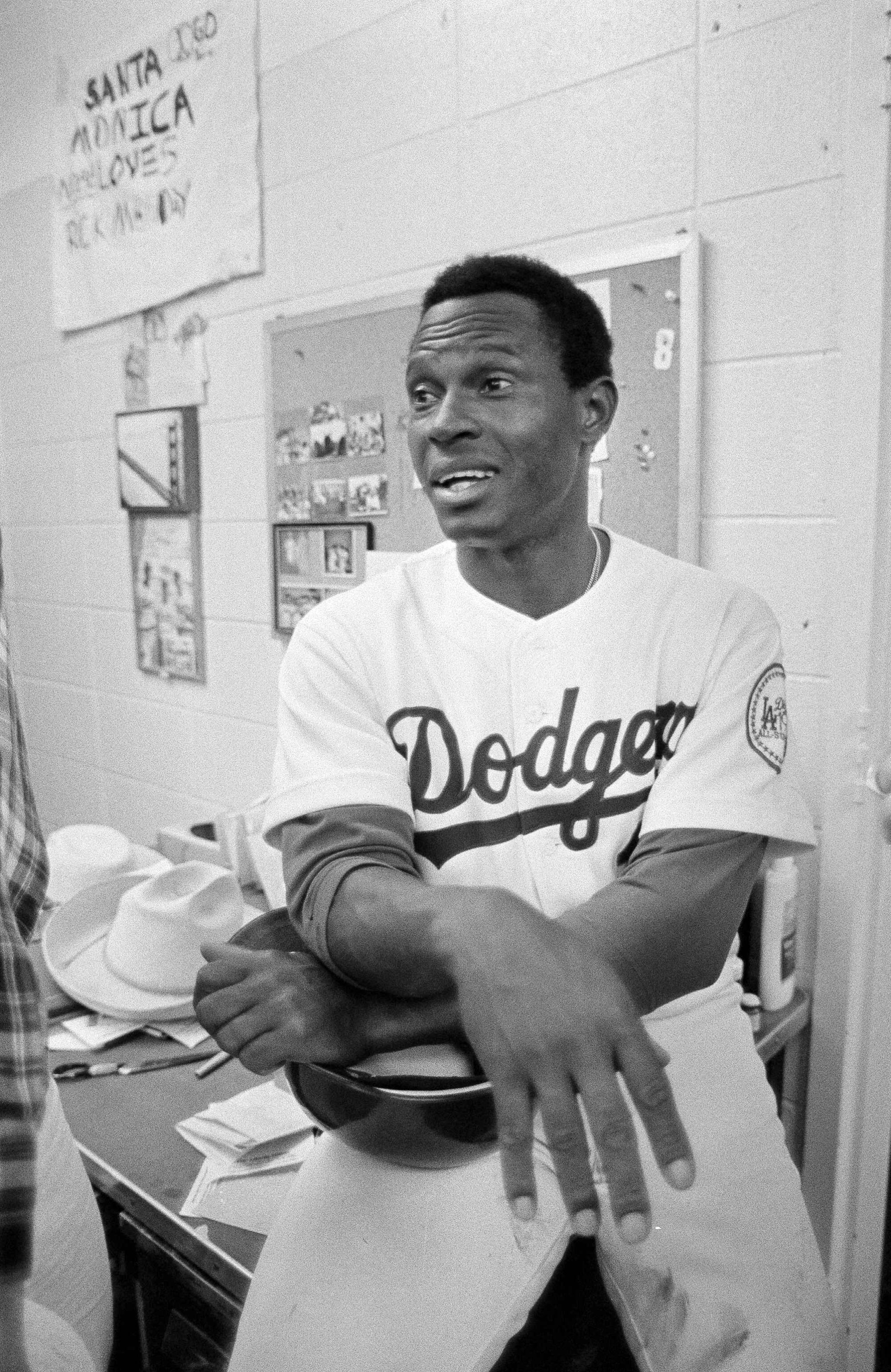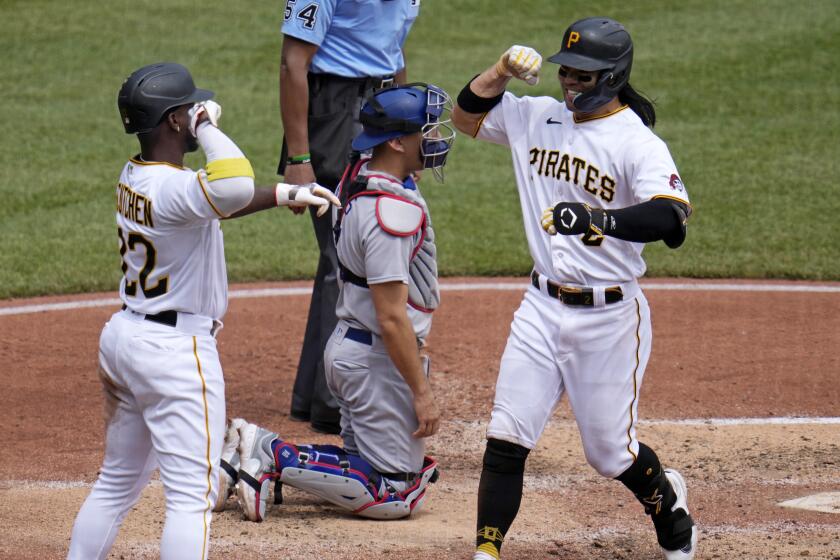
- Share via
Manny Mota watched his first Dodgers game from a mango tree.
It was March 1948. The Brooklyn Dodgers were holding spring training in the Dominican Republic after reaching an agreement with dictator Rafael Trujillo for a reported $60,000. Trujillo had a stadium constructed for the occasion in the capital city, which the dictator named Ciudad Trujllo after himself. The name reverted to Santo Domingo after Trujillo was assassinated in 1961.
Mota was a 10-year-old boy infatuated with baseball. He played games wherever he found them around the city. The Dodgers, coincidentally, were his favorite team. Jackie Robinson, coming off his barrier-breaking rookie season, was his favorite player. But he couldn’t afford a ticket to attend a game in his hometown. He couldn’t even afford the five cents charged to watch from atop a truck beyond the right-field wall. His single mother of eight children had other concerns. The boy devised a plan.
He knew there was a tall mango tree near the truck. He knew if he climbed it high enough he would have a good view of the field. And he knew others knew about it. So at noon, two hours before first pitch, he climbed the tree. He didn’t eat lunch that day, he was so excited. He battled children for a prime spot, but he found one 20 feet up from the ground. From there, he watched the Dodgers face their triple-A affiliate, the Montreal Royals. He’ll never forget that day.
“It wasn’t easy,” Mota said in Spanish. “It was difficult, but it wasn’t impossible. That dream became reality.”
Seventy-five years later, on Saturday, the Dodgers will honor that boy from the Dominican Republic thousands of miles away at Dodger Stadium, his home away from home, by inducting him into the franchise’s Legends of Dodger Baseball. Mota, 85, will join previous honorees Steve Garvey, Don Newcombe, and Fernando Valenzuela. Orel Hershiser will be added to the group in August.
“I don’t consider myself a legend,” said Mota, who emphasized his appreciation for Walter and Peter O’Malley as well as the current ownership group led by Mark Walter over the years. “I consider myself a player who always gave 100% on the field for the team and for the organization. And with the little I’ve contributed to the organization, I don’t have the words to describe how happy I feel and proud and grateful I feel for this recognition.”
Mota appeared in games across 20 major-league seasons, the final 13 with the Dodgers. He was never the best player on his team — he made just one All-Star team and never accumulated 500 plate appearances in a season — but he was renowned and respected for his pinch-hitting exploits on the field and his character off of it.
Angels announcers José Mota and Daron Sutton look back fondly on the experiences they had while tagging along with their dads during their careers.
He was a career .304 hitter who retired with 150 career pinch-hits, at the time the most in major league history. He transitioned to first base coach under manager Tommy Lasorda in 1980 — and became a 42-year-old player-coach that September when he was activated for pinch-hitting duties. He went three for seven over the final month of the season. Two years later, he was activated again for one final at-bat: a groundout against Jim Kaat in a 13-inning loss to the St. Louis Cardinals.
In his rookie season with the San Franscisco Giants in 1962, Mota played with Willie Mays. He spent six seasons with the Pittsburgh Pirates, becoming such good friends with Roberto Clemente that he refers to the Hall of Famer as a brother. But it was in Los Angeles where Mota and his family became embedded after he arrived in a trade with Maury Wills from the Montreal Expos during the 1969 season.
“Los Angeles, for us, for our family, is our home outside of our country,” Mota said.
Mota grew up helping his mother, Fredesvinda, however he could in Santo Domingo. That meant sometimes selling candy and pastries she made to local grocery stores. He often, however, would venture off to play baseball during his sales trips, frustrating his mother. Eventually, Fredesvinda sent him to the countryside with a family friend to work in agriculture.
“My dad was like, ‘When she did that, I was in heaven because I got to play baseball in the country, en el campo, all day,’” José Mota, a Dodgers broadcaster and Mota’s oldest son, said.
Mota was later recruited to play for Trujillo’s air force team alongside other future major leaguers, including Juan Marichal. From there, Mota signed with the New York Giants for $400 in 1957. He was 19. Five years later, after regularly confronting segregation as a Black man in the south in the minors, he made his major league debut against the Dodgers in San Francisco. He was traded after the season to Pittsburgh where his career took off — thanks to Clemente.
Mota recalled Clemente approaching him after a game in May 1964 to offer congratulations for keeping his spot on the team. Mota had gone four for four the previous day and hit a triple against Warren Spahn that afternoon. Clemente, Mota said, told him that the front office was planning to send him to triple-A until Clemente demanded that Mota get another chance. Mota never returned to the minor leagues.
“I didn’t know any of that,” Mota said. “I just played against lefties and went about my day. The front office respected Roberto and they listened to him.”
The Expos chose Mota in the expansion draft in 1969. He and Wills were traded to Los Angeles in June. Mota welcomed the move. It was a chance to compete for championships again, to play in warmer weather, and to suit up for his favorite team. He eventually became a trusted choice for manager Walter Alston in late-inning situations.

“Walter Alston had so much faith in him,” said Jaime Jarrín, who was on the Dodgers’ Spanish-language radio broadcasts for 64 seasons. “He said, ‘Manny Mota could be sleeping, get out of bed, go to bat and get a hit.’ They weren’t hard hits, line drives, nothing like that. He had an ability to place the baseball here, there and here and there.”
Knowing his role, Mota reported to the ballpark early for his pregame preparation before the regulars arrived. He compiled at least 300 plate appearances in his first four seasons as a Dodger, culminating in his only All-Star appearance in 1973, but he never amassed more than 72 in any of his final six full years, becoming the preeminent pinch-hit specialist in the majors. His 146th career pinch hit in 1979 set the major league record.
“The playing days were nerve-wracking for us in the stands,” José Mota said. “Because he’d be called to hit when the game was on the line. So we were in Section 105 and everyone would turn around and say, ‘Your dad’s hitting.’ My poor mom. She was on and off. She would come to the stadium sometimes and other times she just couldn’t handle it.”
Mota returned to the Dominican Republic days after the Dodgers’ season ended to play for the Tigres del Licey in the country’s winter league, later becoming the team’s manager. His standing with his two teams produced a longstanding agreement that had the Dodgers send players to Licey for winter ball. The list of imports included Steve Garvey, Steve Yeager, Jerry Reuss, Mike Scioscia, Charlie Hough, Rick Sutcliffe, and Hershiser.
By then Mota was also recognized for his humanitarian efforts in the Dominican Republic through the Manny Mota International Foundation, a non-profit organization officially established in 1991 that formalized the community work he and wife Margarita began from their house in the 1970s.
The goal was simple: to help the neediest children. It all started with local kids going to their home for food during the offseason. It evolved into Christmas and Three Kings Day giveaways with people lined up down the block for a gift. Mota took whatever his Dodgers teammates would give him — gloves, cleats, bats, caps, shirts — and send boxes to the Dominican Republic for the league they established.
Julio Urías struggles again and the Dodgers lose to the Pirates to fall back to .500. They have dropped three of their last four series.
“Everybody had Dodger stuff,” José Mota said, “because they knew where to go to get Dodger stuff.”
Mota’s foundation work continued through the years as he moved on from player to coach to broadcaster — a role he initially tried out by volunteering to interview Latinos on other teams in Spanish for Jarrín’s radio broadcast during his playing days. The nonprofit has raised money for baseball fields, a medical clinic, and schools in the Dominican Republic.
It’s been Mota’s way to help kids like that boy who climbed that mango tree to watch Jackie Robinson and the Dodgers 75 years ago.
More to Read
Are you a true-blue fan?
Get our Dodgers Dugout newsletter for insights, news and much more.
You may occasionally receive promotional content from the Los Angeles Times.









